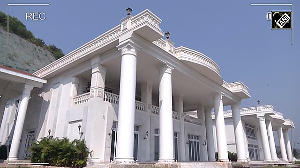Pakistan on Thursday cautioned the North Atlantic Treaty Organisation that any 'activation' on its border with India would affect its involvement in the war on terror, including the anti-militancy drive launched by it in the tribal area bordering Afghanistan to flush out Al-Qaeda and Taliban militants.
Foreign Minister Shah Mehmood Qureshi stated this after a meeting with visiting NATO Secretary General Jaap de Hoop Scheffer, who sought deepening cooperation and developing political dialogue between Pakistan and the European military alliance to achieve common strategic objectives.
Any 'activation on the eastern border' would affect Pakistan's involvement in the war on terror, Qureshi told a joint press conference after their talks.
"Despite our concerns, we are fulfilling our responsibilities and obligations on the western borders," he said, adding, "If we are more focussed our efficiency will improve."
"De-escalation will help Pakistan concentrate on the western border (with Afghanistan)," he said, apparently referring to tensions with India in the wake of the Mumbai attacks.
However, Scheffer said his interactions with Pakistani interlocutors had not given him any indications that there was any fear regarding the eastern border.
He said there was noting happening on the eastern border that was to the detriment of the Pakistani anti-militancy operations on western border.
"NATO respects the sovereignty of Pakistan. The ISAF (International Security Assistance Force) mission stops at the border with no exceptions," the NATO Secretary General said.
NATO leads the ISAF comprising over 51,000 troops from nearly 40 countries to assist Afghan security forces in the fight against Taliban.
During their talks, both Qureshi and Scheffer discussed anti-militancy operation along the Pakistan-Afghanistan border. A planned troop surge by NATO and the US as well as the fallout of the Mumbai attacks also figured in their talks.
Qureshi said he had briefed the NATO chief about the steps taken by Pakistan to de-escalate and defuse tensions in the region.
Both leaders agreed that the troop surge in Afghanistan should be accompanied by a "civilian surge", focussing on economic development, infrastructure and political engagement.
During the news conference, Qureshi was asked about the Obama administration's warning that Pakistan would be held accountable for security in the border regions of Afghanistan and its performance in the war on terror would be linked to the US non-military financial aid.
To this, he merely said the initial statements coming from the new US administration were "encouraging and positive".
Qureshi especially referred to Obama's "positive statement" about engaging the Muslim world in a more meaningful manner.
Referring to the situation in the Pakistani tribal area, he said "it is not just a US concern, it should be our concern.
"The people are suffering. We have our concerns. We want a stable and peaceful FATA (Federally Administered Tribal Area). This should be done through socio-economic development."






 © 2025
© 2025